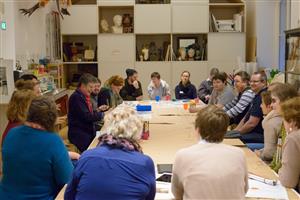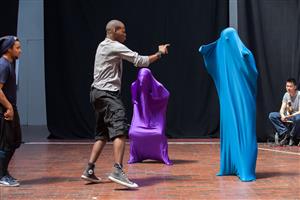3D Mural Models by Jill Wells
Iowa, USA
Inspired by Street Art Belgrade, Jill Well began to create 3D mural models, with a first one installed at King Elementary School in Des Moines.
The Zero Project Inclusive Arts initiative is dedicated to harnessing the transformative power of Arts and Culture to positively impact society. The Zero Project believes that exposure to and participation in the Arts can strengthen communities, drive economic growth, enhance education, and improve health and wellbeing.
This commitment is aligned with international standards, including the UN CRPD, the Marrakesh Treaty, and the American Disability Act of 1990. The Zero Project firmly stands for breaking down barriers that hinder people with disabilities from accessing the Arts, including access to buildings, education, training, and employment opportunities. An accessible world of Arts and Culture fosters vibrant, inclusive communities, supports disabled Artists, promotes independent living, and encourages entrepreneurship.

The Zero Project finds and shares solutions that remove barriers for persons with disabilities. At the Zero Project Conference 2023, Street Art Belgrade created an accessible artwork titled “Inclusion”. This inspired replication in the US and Austria.
The "Inclusion" mural, unveiled during #ZeroCon23 at the United Nations Office at Vienna, showcases the transformative power of street art. Created by Serbian artist Jana Danilović, this mural embodies the universal truth that love and touch transcend barriers, depicted through two women embracing—one seated in a wheelchair. Their sweaters, adorned with blue polka dots on a coral background, symbolize unity amid diversity. Turquoise hues backdrop the scene, with sparrows soaring freely, evoking a sense of boundless possibility.
This landmark project, made possible by Street Art Belgrade, pioneers inclusive street art practices globally. "Art in Passing," initiated in 2021, aims to make street art accessible to visually impaired individuals through 3D printed tactile models. These models, enriching the art experience with texture and perspective, underscore the belief that street art should be enjoyed by all.
In Austria, inspired by Street Art Belgrade's initiative, there are now three barrier-free street art works in the seventh district of Vienna, at Karl-Farkas-Park. Martin Essl, Petra Burger, and Markus Reiter spearheaded this accessibility drive, integrating tactile models and Braille descriptions to ensure inclusivity.
Similarly, in the US, Jill Wells, a Fellow at The Harkin Institute, champions accessible art with 3D mural models. Her latest endeavor, unveiled at King Elementary School in Des Moines, aims to reshape Iowa's mural landscape, empowering individuals of all abilities to experience public art.
These initiatives, rooted in collaboration between Street Art Belgrade and The Zero Project, signify a global shift towards inclusive art, fostering connection and belonging for all.

3D Mural Models by Jill Wells
Inspired by Street Art Belgrade, Jill Well began to create 3D mural models, with a first one installed at King Elementary School in Des Moines.

Tactile models of three artworks
In the public square Farl-Farkas-Park in Vienna's 7th district, three tactile models of the local street art were installed.
Learn about the artworks at Karl-Farkas-Park in Vienna and the tactile models:
“To make this vision a reality, we advocate for the creation of job profiles, a legal framework, and dedicated resources to fully integrate people with disabilities into the Arts and Culture sector. “
Based on the insights gathered from our Zero Project Inclusive Arts Community, the core focus areas for Zero Project Inclusive Arts include:
Joining the Zero Project Inclusive Arts Community offers a multitude of benefits, including:
Contact the Zero Project to become a part of the Zero Project Inclusive Arts Community and contribute to a more inclusive world through the power of the Arts and Culture:
Examples of Awardees from previous research cycles
Every year, the Zero Project conducts research to identify solutions that remove barriers for persons with disabilities. Following a call for nominations and a multi-stage selection process with extensive peer-review by international experts, the Zero Project Awardees are recognized based on their innovation, impact, and scalability. Find a few examples here and click on the cards to find more information on the Zero Project Database.

Austria
ARCHES is an EU-funded project that brings together partners from the fields of culture, technology,…
Spain
The Fundación ONCE International Contemporary Art Biennale is an inclusive art exhibition…

United States of America
‘Access to Theatre’ is a free inclusive arts programme designed to help young people develop…